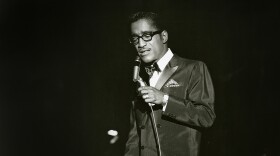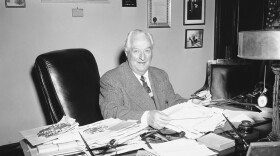When Sarann Knight Preddy died at the age of 94, gaming and the African American community lost their grande dame. Come to think of it, so did everybody else in Nevada.
She was born in Eufaula, Oklahoma, in 1920. She came west with her family and then-husband in 1942 at a time when large numbers of African Americans were moving west. At the time, most of the new arrivals to West Las Vegas had been coming from a couple of southern mill towns, Tallulah, Louisiana, and Fordyce, Arkansas, some of them recruited by Basic Magnesium. Sarann Knight took her own path—then and always.
Her father was a carpenter and built them a house at a time when many West Las Vegans lived in tents and shacks. She headed for Jackson Street, in the heart of the historic Westside, the area’s equivalent of downtown’s Glitter Gulch with its clubs with gambling and entertainment. She got a job at one of them, the Cotton Club, as a keno writer.
Her husband got a new job in Hawthorne, so they moved north. She borrowed six hundred dollars from her father to buy a local casino, which she renamed the Tonga Club. In heavily segregated Hawthorne, that was the only spot for African Americans. It was a success in part, she told historian Claytee White, because of the popularity of her barbecue sauce recipe. She became the first black woman to hold a gaming license in Nevada. After returning to Las Vegas, she ran another club, the Playhouse Lounge, and later The People’s Choice.
She also managed still another distinction. She became a dealer at Jerry’s Nugget in North Las Vegas at a time when women were being kept from doing that job. The NAACP had complained, and the operators of Jerry’s said they would hire a woman if a qualified one could be found. Sarann Knight-Preddy was more than qualified, and kept the job for several years.
Knight-Preddy tends to be most remembered now for the 12 years she spent trying with her family to revive the historic Moulin Rouge. It had opened for a few months in 1955 and was the site of the agreement to desegregate Las Vegas casinos in 1960. But the Rouge often was more of a dream than a reality, and so it went for her. Financing was a problem, and she finally had to give up.
[[field:story]]
But that didn’t mean that she gave up on life or business. She was constantly involved in new projects, and in trying to help her community. She was active in the NAACP, serving on the executive board and setting up a women’s auxiliary. She was involved in politics, running for office, joining the Voters League of West Las Vegas, and helping to start the Las Vegas Barbara Jordan Democratic Club. She avidly promoted the history and preservation of West Las Vegas.
Sarann Knight Preddy was a stylish, hard-working, gracious, opinionated African American woman who grew up in a difficult time and built a life of great significance. We don’t have to say she should be remembered. She WILL be.
Nevada Yesterdays is written by Associate Professor Michael Green of UNLV, and narrated by former Senator Richard Bryan. Supported by Nevada Humanities










